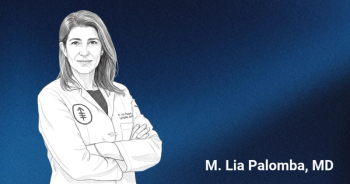
Response Rates Hover Around 100% for CAR T-cell Therapies in ALL
Two CD19-targeted chimeric antigen receptor (CAR)-modified T-cell therapies showed complete response (CR) rates from 90% to 100% in patients with high-risk acute lymphoblastic leukemia (ALL), according to data from two studies presented during the 2015 ASH Annual Meeting.
Stephan Grupp, MD, PhD
Two CD19-targeted chimeric antigen receptor (CAR)-modified T-cell therapies showed complete response (CR) rates from 90% to 100% in patients with high-risk acute lymphoblastic leukemia (ALL), according to data from two studies presented during the 2015 ASH Annual Meeting.
In the first set of data from a recent trial, CTL019 demonstrated a 93% CR rate in pediatric patients with relapsed/refractory ALL. A median follow-up of 12 months showed 79% of patients enrolled remained alive. Additionally, the relapse-free survival rate was 76% and 55% at 6 and 12 months, respectively.
“This clinical trial of CTL019 is the largest study of a CAR-T therapy in pediatric patients with relapsed or refractory acute lymphoblastic leukemia, and it is helping us better understand the therapy's potential to achieve durable responses in this patient population,” said lead investigator Stephan Grupp, MD, PhD, Yetta Deitch Novotny Professor of Pediatrics, Perelman School of Medicine at the University, Pennsylvania.
In data from a the second trial, conducted by the National Cancer Institute (NCI) and Kite Pharma, a CD19 CAR T-cell therapy showed a 100% CR rate in 9 patients with primary refractory ALL and for 5 patients with CNS ALL. All patients who achieved a CR also tested negative for minimal residual disease (MRD). Those with Philadelphia chromosome-positive and downs syndrome-related ALL experienced an MRD-negative CR rate of 60% and 67%, respectively.
“There was a 60% complete response rate in this ultra-high risk ALL population and a 100% MRD-negative response rate in primary refractory and CNS leukemia," said lead investigator Daniel W. Lee III, MD, Pediatric Oncology Branch, Center for Cancer Research, National Cancer Institute. “This treatment was a bridge to transplant in refractory patients.”
In the phase II study exploring CTL019, 59 patients with CD19-positive ALL received treatment with the modified T-cells at a median 4.3x106 cells/kg over 1 to 3 days. One week prior to treatment with CTL019, a majority of patients received lymphodepleting chemotherapy.
Of those who responded, 6 went on to receive subsequent stem cell transplantation and 18 patients remained in CR for more than 1 year. There were no relapses past the 1 year mark.
Overall, 88% of patients experienced grade 1 to 4 cytokine release syndrome (CRS) with CTL019. The severity of CRS was related to tumor burden and coincided with response. Overall, 27% of patients with CRS developed hemodynamic or respiratory instability that was reversed by IL-6 receptor antagonist.
“With each child we treat as part of this trial, we learn more about the potential of CTL019 to help patients whose cancers cannot be controlled with conventional therapies,” said Grupp. “The response rate and durability we are seeing are unprecedented, and gives us hope that personalized cellular therapies will be a powerful key to long-term control of this difficult cancer.”
In the NCI study, those with a high burden of disease (≥25% marrow blasts) were treated with high dose regimen to reduce tumor burden prior to CAR T-cell infusion. Regimens included FLAG, ifosfamide/etoposide, and high dose fludarabine with cyclophosphamide. After lymphodepletion, all patients received 1x106 CAR T cells/kg.
All patients responding with primary refractory ALL went on to receive a stem cell transplant. At the time of the analysis, all patients remained alive and 88.9% remained disease-free (range 5-28 months). A response was not seen for patients with MLL rearranged ALL (n = 2).
An early intervention algorithm developed by the NCI was utilized to prevent CRS. Under this grade-driven system, those with grade 1 CRS received vigilant supportive care. For grade 2 CRS, if the patient had extensive comorbidities or an older age, and for those with grade 3 or 4 CRS, tocilizumab was initiated with or without corticosteroids along with supportive care.
Using this system, there were no grade 3 incidences of CRS and 1 grade 4 event (4%). Overall, there were no severe or permanent neurologic toxicities and no neurocognitive declines, in patients responding to therapy.
“Institution of the grade-driven algorithm reduces life-threatening CRS,” said Lee.
Multiple trials are exploring CD19-directed CAR T-cell therapies across a variety of cancer types. Additionally, there are studies looking at CD22-directed CAR T-cell therapies for ALL. Building on the findings seen with CD19 agents and the rationale behind CD22-directed therapies, there are plans to develop bispecific CAR T-cell therapies for CD19 and CD22, Lee said.
References
- Grupp SA, Maude SL, Shaw PA, et al. Durable Remissions in Children with Relapsed/Refractory ALL Treated with T Cells Engineered with a CD19-Targeted Chimeric Antigen Receptor (CTL019). Presented at: 57th American Society of Hematology Annual Meeting; Orlando, Florida; December 5-8, 2015. Abstract 681.
- Lee DWL, Stetler-Stevenson M, Yuan CM, et al. Safety and Response of Incorporating CD19 Chimeric Antigen Receptor T Cell Therapy in Typical Salvage Regimens for Children and Young Adults with Acute Lymphoblastic Leukemia. Presented at: 57th American Society of Hematology Annual Meeting; Orlando, Florida; December 5-8, 2015. Abstract 684.



















